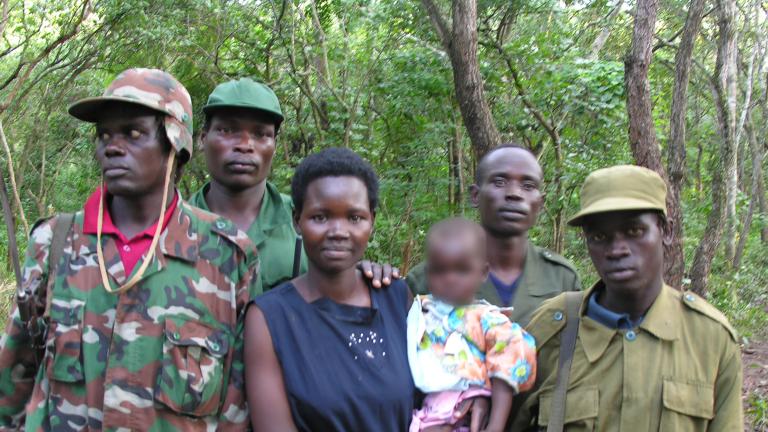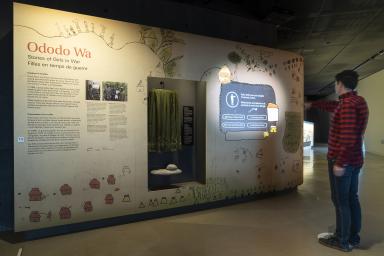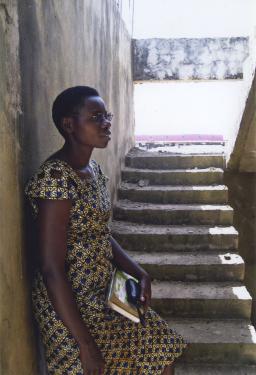This release is more than two years old
This release is more than two years old. For additional information, please contact Amanda Gaudes from our Media Relations team.
News release details
Two Ugandan women abducted as girls and held captive for years by a notorious military rebel group are at the Canadian Museum for Human Rights today to open a new exhibit called Ododo Wa: Stories of Girls in War.
Evelyn Amony was abducted at age 11 and forced to marry infamous Lord’s Resistance Army leader Joseph Kony when she was just 14. Grace Acan was abducted with 138 other girls from St. Mary’s College Aboke, a Catholic boarding school, at age 16. They are speaking at a public event in the “Rights Today” gallery at 1:30 p.m., joined by curator Isabelle Masson and representatives from the Conjugal Slavery in War Project based at York University in Toronto.
The new exhibit explores the trauma of captivity, conjugal slavery and forced labour from the perspective of these two women. It includes artifacts such as a bullet‐riddled skirt once worn by Amony, hand‐made drawings of life in the rebel camps, and animated films with clips from CMHR oral history interviews conducted with the two women.
Their experiences reveal a dimension of war that is too often ignored. While sexual violence is commonly seen as an unfortunate consequence of armed conflict, it is often a deliberate strategy. This issue has increasingly gained international attention. Last year’s recipients of the Nobel Peace Prize (Denis Mukwege, a doctor in the Democratic Republic of Congo, and Nadia Murad, a Yazidi woman from Iraq) were honoured for their efforts against the use of sexual violence as a weapon of war.
Ododo wa means “our stories” in the Luo languages of northern Uganda. By connecting use of storytelling in healing with the unique voices of Acan and Amony, the exhibit amplifies the hopes, courage and strength of women survivors as they work for awareness and justice.
Ododo Wa: Stories of Girls in War runs at the Canadian Museum for Human Rights until November 2020. It was developed by the Museum in collaboration with Acan and Amony, and in partnership with the Conjugal Slavery in War Project. A travelling version has also been created that will first be shown in Uganda as a way to spark and sustain dialogue about women’s experiences in conflict and war.
The Museum has also developed an extensive online resource guide for more information about children in war and conflict, including lists of books, media reports, documentaries, organizations, academic papers, government publications and statistics.
Background
The Lord’s Resistance Army (LRA) waged war against the government of Uganda for more than 20 years, starting in the mid‐1980s. Tens of thousands of children were abducted and forced into the ranks of the rebel army led by Kony. Both boys and girls received military training and were forced to carry heavy loads of ammunition and supplies through bush and over mountains, walking for days on end with little food and water.
Girls like Amony and Acan not only served as soldiers and labourers but were forced to act as wives to the military commanders and bear their children. Their lives were in constant danger as they endured warfare and extreme living conditions, witnessing unspeakable crimes against humanity.
When they finally escaped after years in captivity, they faced new hardships from poverty and ostracization due to their time with the LRA. After many years struggling to rebuild their lives, Amony and Acan became leaders and spokespeople for women who have survived these ordeals. Both published books about their experiences.
In 2008, they helped establish the Ugandan Women’s Advocacy Network, which now represents 900 survivors. The women have banded together to heal and advocate for reparations such as access to health care, financial compensation, education and recognition of inheritance rights for their children born in captivity.
In June of this year, the government of Uganda approved a long‐awaited Transitional Justice Policy, which sets up a framework of processes to seek sustainable peace, accountability, justice and reconciliation after decades of devastating civil war.
Kony was indicted by the International Criminal Court (ICC) in The Hague in 2005 for war crimes and crimes against humanity but remains at large. An ICC proceeding continues against LRA commander Dominic Ongwen, who was himself abducted by the LRA and forced to be a child soldier before rising to leadership in the rebel ranks.
-30‐
This release is more than two years old
This release is more than two years old. For additional information, please contact Amanda Gaudes from our Media Relations team.


